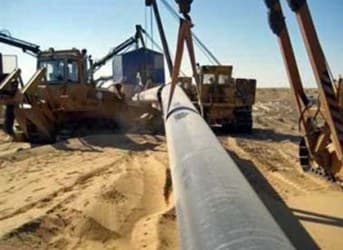Perhaps nowhere in the world are Washington’s diplomatic efforts more schizophrenic than in dealing with Pakistan.
On the one hand, the U.S. regularly lauds Pakistan as a stalwart ally in its global war on terror and yet U.S. drones regularly violate Pakistan’s airspace in their hunt for militants, provoking increasing anger in Islamabad.
Even worse, on 26 November 2011 a NATO aerial assault on two Pakistani border posts in Mohmand Agency in Pakistan's turbulent NorthWest Frontier Province killed 24 Pakistani soldiers on Pakistani soil, leading Pakistan to close down its border crossings for NATO logistics until an apology was received.
Islamabad only just received an apology.
Washington is now sending equally contradictory signals about two proposed natural gas pipelines that would begin to alleviate the country’s chronic energy shortages. That Pakistan is in the grip of an unprecedented energy crisis is evidenced by the fact that the newly elected Prime Minister of Pakistan, Raja Pervez Ashraf, recently met with National Power Control Center officials for a briefing about the country’s energy crisis, after which he stated at a press conference that resolving the nation’s energy crisis was his “top” priority. In the short term Ashraf said that he had instructed the Ministry of Petroleum to ensure an uninterrupted supply of 28‚000 tons of oil daily to the power sector and that his administration will add 1,200 megawatts of electricity to the National Grid System.
The “good” pipeline favoured by the Obama administration?
The $7.6 billion Turkmenistan-Afghanistan-Pakistan-India (TAPI) pipeline.
The “bad” pipeline, which Washington opposes?
The Iran-Pakistan (IP) pipeline.
The $1.6 billion IP pipeline, if built, would export 21.5 million cubic meters daily of Iranian natural gas to Pakistan.
Embodying Washington’s contradictory approach to the two pipelines, on 23 May during a press briefing State Department spokesman Victoria Nuland, in response to a question about the IP pipeline, said, “Well, we have had regular consultations, both with regard to the pipeline. You know where we are on that one. We don’t think it’s a good idea. We don’t think it’s a reliable route for Pakistan. We’ve also continued to have conversations about diversifying supply and other ways to do that.”
In reply to a question about TAPI Nuland continued, “Turkmenistan, Afghanistan, Pakistan, India. This is a perfect example of energy diversification, energy integration, done right. We are very strong supporters of the TAPI pipeline. We congratulate the countries that signed it today. We consider it a very positive step forward and sort of a key example of what we’re seeking with our New Silk Road Initiative, which aims at regional integration to lift all boats and create prosperity across the region.”
The dialogue continued, “question: But just sticking with the pipeline, why is this TAPI pipeline a perfect example of energy integration and diversification and the other pipeline isn’t?
Nuland: Well, the other pipeline, as just to be clear, goes to an unreliable partner who is not complying with its international obligations with Iran. And we’ve been very clear about how we feel and how the international community feels about those kinds of investments. In this case – the case of the TAPI pipeline – you’ve got private sector investment, you’ve got new transit routes, you’ve got people-to-people links, you’ve got increased trade across a region that historically has not been well-linked or there have been historic antipathies which are now being broken down by this positive investment project that’s going to give jobs, it’s going to give more energy, it’s going to give more technology to the people of all of these countries.
Question: And that wouldn’t be the case with the Iranian pipeline?
Nuland: Again, if Iran wants to come back into compliance with its international obligations, the whole picture’s going to look different in terms of the way we feel about investment.
Question: Well, here’s the – I mean, here’s the thing, you don’t like the other pipeline because it has to do – because it has – it involves Iran, right?
Nuland: I think we’ve said that.”
ADVERTISEMENT
As if any more diplomatic complexity on the issue was needed, last week, the Russian Federation began exploring options for assisting in financing both the IP and TAPI pipelines, whose projected total costs are $9.2 billion. Pakistani Ministry of Petroleum and Natural Resources officials handed over their project plans to a high-profile Russian delegation led by Deputy Minister for Energy Iuri Sentiurin.
So, the U.S. government is essentially telling Islamabad that despite its power problems, it must import energy sources approved by Washington, a situation that will be hard to explain to the Pakistani in the street, already suffering electricity blackouts of up to sixteen hours a day. Not only would TAPI cost nearly five times the IP line, but it would traverse Afghanistan, hardly a stable country at present.
The Obama administration has already cut some of its allies some slack on imposing sanctions over their imports of Iranian crude oil, including South Korea, Japan and Turkey.
It should do the same with Pakistan.
By. John C.K. Daly of Oilprice.com


















